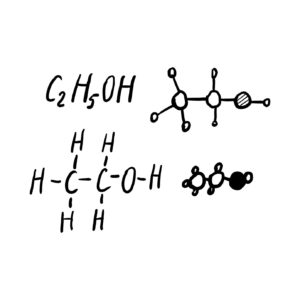As the second most abundant component in wine (after water), understating alcohol’s role in wine is important. Alcohol is so central to the definition of wine that in many countries around the world, there are stated alcohol minimums in order for a fermented grape product to even be called wine (5.0% in the UK, 8.5% (with exceptions) in the EU, and 0.5% in United States). Alcohol is important for sensory, stability, and health reasons, but there are also important negative consequences as well.
The sensory impact is the most obvious and important role that alcohol plays in wine. Alcohol enhances perception of the body and also increases aromatics as it carries aroma molecules with it when it volatilizes. Wine is certainly more generous in weight and aromatics than grape juice. Alcohol also provides a warming sensation on the palate as well as in your skin as alcohol causes blood vessels to dilate, moving blood closer to the surface of your skin.

Alcohol also enhances the stability (and shelf life) of a wine. Specifically, alcohol is toxic to wine yeasts above ~15.5%. A moderate alcohol wine (11-14%) with the smallest amount of residual sugar is subject to refermentation in the bottle unless sterile filtered (not possible until post-WWII) or fortified to 16%+ alcohol. The classic example is Port, which has high levels of sugar (around 100g/L) but remains stable in the bottle due to the 19%+ alcohol by volume. In this case, the sugar helps to preserve the Port for many years, aided by the stability and longevity that the high alcohol provides.
Alcohol plays an important role in the longevity of humans as well. For centuries, wine and beer was preferred over water because microbes could not survive in wine and beer and were, therefore, more “clean” to drink than water. More recently, studies have shown moderate alcohol consumption can decrease the chance of everything from diabetes to dementia and even reduce your risk of cardiovascular disease. Beyond diseases, Catholic University of Campobasso recently analyzed a pool of studies and concluded that moderate alcohol consumption can decrease your chance of death by 18%.
But drinking more than moderate amounts can have important negative consequences. In addition to increasing your chances of liver disease and certain types of cancer (including breast cancer), large amounts of alcohol can negatively impact your physical (inflammation, lack of coordination, slurred speech) and mental health (memory loss, poor judgement, addiction). Social consequences of alcohol are an important topic in many parts of the world with organizations like DrinkWise in Australia and DrinkWare in the UK specifically setup to reduce the misuse of alcohol.
Alcohol in wine is important. Wine would not be the same pleasurable experience without alcohol nor would it last as long in the bottle. Alcohol is important for its health consequences, and when wine is allowed to be a respectful guest at the dinner table, the health benefits and the pleasure will accrue to the drinkers as well.


